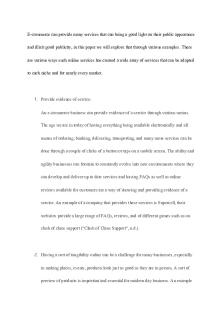Bus 598 - assignment PDF

| Title | Bus 598 - assignment |
|---|---|
| Course | Business Internship |
| Institution | College of Staten Island CUNY |
| Pages | 3 |
| File Size | 85.7 KB |
| File Type | |
| Total Downloads | 16 |
| Total Views | 153 |
Summary
Bus 598 assignment Fall 2018...
Description
BUS 598 11/07/2018
1. Describe cultural relativism and ethical imperialism. Why is neither a satisfactory approach to international business ethics? Cultural relativism supports the idea that no culture’s ethics, laws or way of managing and or doing business are better than any other’s, which leads to the belief that there are no rights or wrongs when doing business abroad or companies managing business like they would do at home (country of origin), business people who follow this idea understand that there is more than one way to do business when being in a different country, not necessarily the way they are used to do business. Ethical imperialism on the other hand supports the idea that people “should do everywhere as they would do at home”, which forces people to impose they habits and cultural ideas on another society. People who follow this belief are likely to be less successful than others, since business abroad may see this behavior as disrespectful towards their culture and therefore their country. Neither of these two approaches are satisfactory, they are at two different extremes when it comes to handling a situation while doing business abroad, like the article says “The answer lies somewhere in between”, meaning that people should respect a way of doing business in a different country, but also impose ideas and habits from home when needed. 2. What core values does Donaldson recommend international business people use to establish standards for ethicals conduct which will work anyplace in the world?
Donaldson recommends some core human values like, “…people having the right to good health, the right to economic advancement”. Donaldson believes every single person should be able to enjoy the right to these values. These are important because people should be recognized and treated as human beings, not tools someone can use and do business with. People should also show respect to the culture when doing business abroad, business people should know and understand what is right or what is wrong in the places they are currently working at. He also emphasizes that companies should "...respect human dignity" and acknowledge their value, also providing a safe environment where they are able to work. Employing and taking away the opportunity to receive education from children is seen as a "intolerable practice", same as lying about the production of certain products in order to sell them. 3. What guidelines does he offer for fostering ethical conduct in a firm? One of the guidelines is to treat the company’s values and standards of conduct as definite which means that they have to respect the ethical standards they chose. Also to create and implement conditions for suppliers and/or customers, meaning that the company will do business with suppliers who do not violate the company’s ethical policies. Another guideline is to allow businesses from another countries to help come up with ethical standards and interpret ethical issues, meaning taking in consideration foreign business thoughts of what is ethical and what is not, in order to create a “global ethics strategy, locally deployed”
4. Give examples of corporate behavior that reinforce the idea in (2) and (3) above. Not understanding the way people manage businesses in a foreign country could take away the opportunity of being to succeed abroad. On the “Going International” documentary and
American who was in Mexico in a business trip, was having trouble getting the Mexican person to sign the contract. Even though the Mexican man was giving him many signs trying to get him o understand that in Mexico, having a personal relationship with the person is more important than going straight to business. Also how bribery in America is seen as an unethical action in the business world, but in many other countries this is common practice while working with other people....
Similar Free PDFs

Bus 598 - assignment
- 3 Pages

Bus 598 - donaldson assignment
- 3 Pages

Bus 130 140 Assignment
- 11 Pages

BUS assignment individual
- 7 Pages

Assignment Questions Bus Stats
- 10 Pages

BUS 5112-Written assignment
- 3 Pages

Written Assignment BUS 5112
- 4 Pages

BUS 2202 written assignment
- 3 Pages

BUS 210 6-3 Assignment
- 1 Pages

BUS 5112, portfolio assignment 1
- 3 Pages

Bus 5115 Writing Assignment 4
- 3 Pages

BUS 1750 Career Assignment 2
- 1 Pages

BUS 5111 Written Assignment U6
- 10 Pages
Popular Institutions
- Tinajero National High School - Annex
- Politeknik Caltex Riau
- Yokohama City University
- SGT University
- University of Al-Qadisiyah
- Divine Word College of Vigan
- Techniek College Rotterdam
- Universidade de Santiago
- Universiti Teknologi MARA Cawangan Johor Kampus Pasir Gudang
- Poltekkes Kemenkes Yogyakarta
- Baguio City National High School
- Colegio san marcos
- preparatoria uno
- Centro de Bachillerato Tecnológico Industrial y de Servicios No. 107
- Dalian Maritime University
- Quang Trung Secondary School
- Colegio Tecnológico en Informática
- Corporación Regional de Educación Superior
- Grupo CEDVA
- Dar Al Uloom University
- Centro de Estudios Preuniversitarios de la Universidad Nacional de Ingeniería
- 上智大学
- Aakash International School, Nuna Majara
- San Felipe Neri Catholic School
- Kang Chiao International School - New Taipei City
- Misamis Occidental National High School
- Institución Educativa Escuela Normal Juan Ladrilleros
- Kolehiyo ng Pantukan
- Batanes State College
- Instituto Continental
- Sekolah Menengah Kejuruan Kesehatan Kaltara (Tarakan)
- Colegio de La Inmaculada Concepcion - Cebu


